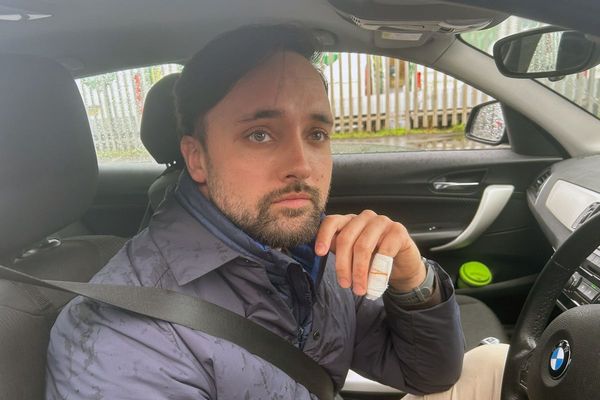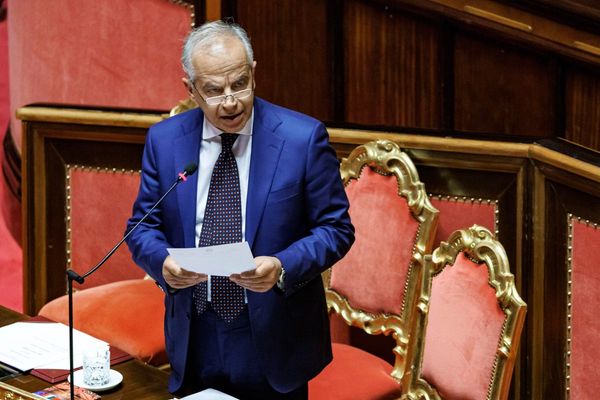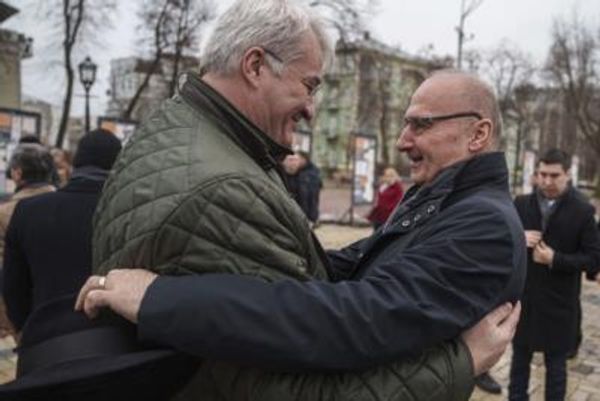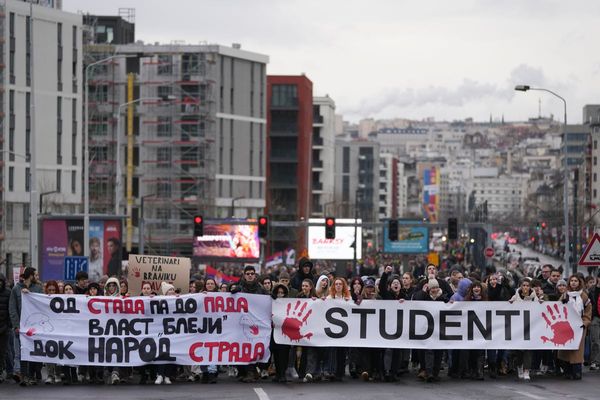
At 85 – and given the powerful emotions of the moment – it would not have been surprising if Aviva Bar-On’s voice had wavered. But as she sang in clear tones in front of an audience of 3,000 people in Jerusalem on Sunday night, it was easy to imagine the nine-year-old Nazi concentration camp prisoner she was once was.
Bar-On performed a song she committed to memory more than seven decades earlier in Theresienstadt camp (now Terezín) in Nazi-occupied Czechoslovakia. Composed by the Jewish poet and musician Ilse Weber, who was later gassed at Auschwitz, the song had never been heard in public.
It was one of 11 pieces performed at the concert, the culmination of a 30-year quest by Francesco Lotoro, an Italian composer and pianist who has tenaciously tracked down thousands of songs, symphonies and operas from the Holocaust.
The music was created in the darkest, most desperate moments imaginable by musicians and performers whose lyrics and scores were written on scraps of paper or memorised. Some were forced to play as their fellow inmates were led to the gas chambers.
“Some [of the music] was written in notebooks, on coal sacks, food wrappers, tickets,” Lotoro said. One five-act opera was found on sheets of lavatory paper. And some of the music was held only in the memories of survivors, now in their 80s and 90s.
Lotoro has travelled the world, searching in bookshops, attics and archives, and interviewing Holocaust survivors. He has salvaged and recorded 8,000 pieces of music, “but there are more than 10,000 more waiting to be deciphered that I have not yet touched”.
On Sunday, for the first time in more than 70 years, a fraction of this music was performed in a concert in Jerusalem called Notes of Hope. The audience included Holocaust survivors and their descendants.
Nineteen children from two music academies in the Negev desert, who have been mentored by Lotoro for the past two years, played with the Ashdod Symphony Orchestra. They were accompanied by some of Israel’s most eminent performers, singing in Hebrew, Yiddish, German, Czech and Romany, with Lotoro conducting.
Despite the circumstances of their composition, most of the songs were spirited and upbeat.
Zitra (Tomorrow), composed by Joseph Roubicek for a young prisoner, Manka, looks forward to a day when “everyone will be happy at heart”. In a video recorded by Yad Vashem, Israel’s Holocaust memorial, and shown at the concert, Manka said “singing was something that made you forget the hunger”.
Tango in Auschwitz, written by 12-year-old Irka Janowski and set to a popular dance tune, speaks of hope and freedom “beyond fences and railings”.

Bar-On sang When I Was Lying Down in Terezin’s Children’s Clinic, which makes light of the illness and disease suffered by many inmates.
The young Czechoslovakian Jew spent three years in the Theresienstadt transit camp from the age of nine. “They were very hard years of hunger, illnesses and epidemics,” she said. “The most terrible thing for me was the toilets, and the long queues. The hygiene situation was very bad.
“But the musical life of the camp was very rich. There were famous opera singers and high-ranking musicians. There were lots of performances, and a women’s choir. We didn’t know about the gas chambers. When people received the order to go to the train we didn’t know where they were going.”
During a spell of sickness, Bar-On was nursed by Weber. “She was a wonderful, smiling lady. She played the mandolin and sang; some of her songs were very funny. Now I’m the only one in the world who remembers them.”
After the liberation of the camp, a small notebook containing Weber’s lyrics was discovered. Eventually it found its way to Lotoro, who was frustrated by the lack of a musical score. But Bar-On’s memory came to the rescue.
In the camp, “people wanted to be optimistic, we were always looking for something positive because life was so terrible” she said. “Death happened every day.”
In Westerbork, another transit camp, Max Ehrlich, a prominent performer in the risque pre-war Berlin cabaret scene, teamed up with fellow musician Willy Rosen to create the Camp Westerbork Theatre Group.
“Suddenly the best cabaret in Europe was to be found in a concentration camp,” said Alan Ehrlich, the performer’s nephew. “Their music became Westerbork hits, with prisoners constantly humming their tunes.”
The camp commandant sat in the front row of all of the troupe’s performances of original songs, jokes, sketches and dance routines. Entranced, he kept the performers’ names off the lists of those destined for the death camps. “They were playing for their lives,” said Ehrlich.
Max Ehrlich was eventually deported to Auschwitz in 1944, where he was recognised by a Nazi guard and forced to perform one last time before being killed.
Born seven months after Max’s death, Alan Ehrlich has spent decades tracing his uncle’s life and works. A breakthrough came with the discovery of a folder of lyrics, scripts and stage instructions in 1998. But, again, the music had to be coaxed from a survivor, Louis de Wijze, who had performed in the troupe.
Alan Ehrlich, who was in the audience of Sunday’s concert, said it was crucial for younger people and future generations to know about the Nazi camps. “In the world today there are conflicting stories [about the Holocaust] that are total lies,” he said. “It’s very important to establish what happened as absolute fact.”

The material uncovered by Lotoro’s dogged detective work originated from Jews, Roma, political prisoners, soldiers and and others in concentration, forced labour and prisoner-of-war camps over a 20-year period.
“In the camps, there was an explosion of creativity,” he said. “When your life is in danger, you create more as a testament for the future.”
The concert, attended by the Israeli defence minister, Avigdor Lieberman, was staged by the Jewish National Fund UK, and timed to mark the 70th anniversary next month of the founding of the state of Israel.
Samuel Hayek, chairman of JNF UK, said he hoped the music would help focus attention on rising levels of antisemitism across Europe and in England “where it is a major cause for concern”.
Speaking after the concert, he said he had been moved to tears by the music. “To be a respected and valued person in a community, then stripped of your humanity and dignity, to be hungry and beaten, to not know where your loved ones are – and then to sing!”
Lotoro said his quest to unearth the music of the Holocaust would continue. “I can’t stop. I feel a moral duty as a person, as a Jew, to go on,” he said. “It’s a mitzvah [a religious good deed], a reparation.”







